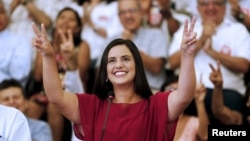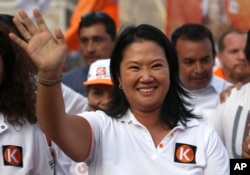A leftist congresswoman promising "radical change" and a new constitution to weaken the business elite has shaken up Peru's presidential race, previously seen as a shoo-in for a fifth straight conservative government.
Veronika Mendoza, 35, surged five points in a poll by Datum Internacional on Friday, putting her in a statistical dead-heat with investor-favorite Pedro Pablo Kuczynski for second place in the April 10 election.
Nine candidates - nearly all free-market advocates - have been vying for the coveted runner-up position behind the race's longtime favorite, 40-year-old Keiko Fujimori, who is not expected to secure the more than 50 percent of votes needed to win outright.
Fujimori, the daughter of imprisoned former President Alberto Fujimori, faces rising opposition that could make her vulnerable in an expected June runoff.
Kuczynski, a 77-year-old former World Bank economist, would likely "abstain" from endorsing either of the two women should they wind up facing one another in a second-round vote, his economic adviser Alfredo Thorne said by phone.
If elected, Mendoza would become Peru's first leftist president in decades, at a time when voters in other South American countries have turned their backs on an anti-capitalist tide led by late Venezuelan President Hugo Chavez.
Peru is set to outpace China as the world's second biggest copper supplier this year as a batch of new mining projects power an economic recovery from a sharp slowdown in 2014.
Mendoza has promised to tighten environmental supervision of mining companies and would halt a scheduled lowering of the corporate tax rate. She has proposed ditching Peru's constitution for one that enshrines access to water as a right, protects the environment and weakens a "corrupt" business elite.
Her economic adviser, Pedro Francke, said she would name a new central bank president to lower interest rates and ask officials in the investor-friendly finance ministry to "pack their bags."
Her running mate, former priest Marco Arana, is best known in Peru for rallying opposition to two major mining projects that were derailed by protests in recent years.
"We want deep and true change, we want radical change," Mendoza said earlier this week.
But Mendoza has denied that she would govern in the mold of Venezuela and has called for a new Latin American left that envisions an active role for private investments.
Spooking Markets
Mendoza faces an uphill battle in Peru, where many are wary of upsetting a long stretch of robust economic fundamentals with unorthodox policies, just as the end of a decade-long mining boom complicates the country's growth outlook.
She was seen as 10 points behind center-right Fujimori if the two faced each other in a June runoff, according to Datum.
Other recent polls showed a smaller gap.
If she did win, she would likely have a hard time pushing her reforms through a Congress that will likely be dominated by members of Fujimori's party.
Mendoza was the only leading candidate to climb in the Datum survey. Lima's select stock index closed 2.7 percent lower after the news and the sol currency dropped 1.3 percent before curbing its losses.
A Mendoza-Fujimori second-round scenario "would likely spook financial markets," said Franco Uccelli with J.P. Morgan.
Mendoza was trailing in polls a month ago and has been riding a wave of voter anger after two of Fujimori's rivals were thrown out of the race in a move that has cast a shadow over the legitimacy of this year's elections.
Many Peruvians believe Fujimori has been unfairly favored by the country's electoral authorities after they cleared her of vote-buying allegations.
Mendoza's surge was reminiscent of President Ollanta Humala's surprise rise leading up to 2011 elections, when he campaigned on promises to make sure more benefited from the country's vast mineral wealth. Humala's administration ends July 28 and he is constitutionally barred from seeking a second consecutive term.
About 14 percent of voters are still undecided in Peru, where casting a ballot is mandatory. The Datum survey, conducted March 28-30, had a margin of error of 2.5 percentage points.






